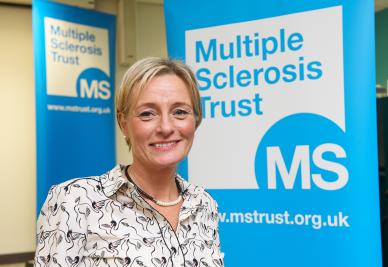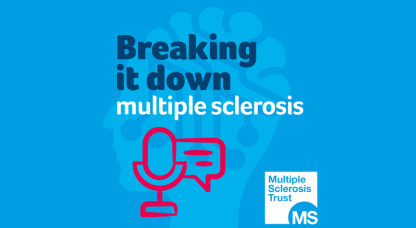How does an Advanced MS Champion differ from a regular MS nurse?
The role of the Advanced MS Champion has come about as it was recognised that MS nurses are having to spend more and more time in clinic and finding it difficult to get out and see people at home. The role that we have enables us to see the person in their home environment. This is invaluable to me as I am able to see for myself how an individual is getting in and out of bed, using the bathroom etc. which you cannot see in a clinic environment. The fact that we are generally not time constrained allows us to provide extra support to people with advanced MS and their families/carers and follow up with people regularly.
What support can an Advanced MS Champion give to carers?
First and foremost it is support for people to know that they are not alone. It can be quite frightening to have the responsibility of caring for somebody who has advanced MS and wondering if you are getting it right. We help carers to understand about the MS in order to feel confident and we can advise about things like carer support groups and respite care.
There’s not an Advanced MS Champion in my area, are there other specialists who can support me?
Absolutely yes. If you have an MS nurse, contact them. Also, the palliative care teams at local hospices are marvellous at helping people with long-term conditions to provide better symptom management and usually have therapists and a doctor as they work as a multi-disciplinary team. The GP can refer you for this service. Online support can be useful also. The MS Trust have a website full of information and advice as do the MS Society. Shift MS is an online forum providing a safe space where people can share, support and connect with other people with MS.
I'd like to know if there's any specific healthcare monitoring needed for those with advanced MS? I often worry that my husband is at a greater risk of CVD, stroke and diabetes due to reduced mobility and being unable to exercise- should he be monitored more closely due to this?
This is a great question and you are absolutely correct. Usually, MS specialist nurses have been general nurses prior to their current role and are adept at assessing for other health risks. We work with GPs and provide health promotion and advice to people and their families. It is important to be vigilant for other health conditions because they can negatively influence the course of MS.
Is physiotherapy something which could be accessed by someone with advanced MS or is it a case of there's no point if you have reduced mobility?
Physiotherapy can be very effective for people with advanced MS. Tailored advice regarding positioning and posture when lying down, seated or standing can prevent further complications such as spasticity, pressure sores and muscular skeletal pain. Regular stretching, gentle manipulation and massage of limbs is very beneficial. Also the physiotherapist is able to advise on antispasticity medication or Botox to relax the muscles.
I need some adaptations in my home. How can I access funding for this?
There are many variables which may affect this process such as savings which may mean you are not eligible for grants, feasibility of adaptations and waiting lists depending on the budget of local authorities. On the whole, however, we can work with you and the occupational therapist to have your needs assessed and works to be carried out without charge. If the costs are high and outside of the budget allocated by local authorities, we may approach charities for extra funding to bridge the gap.
How can we access respite care?
Usually, this is arranged via your social worker who can help with guidance on respite facilities and deal with the practicalities. Respite care can be short-term residential care in a residential home or holiday but can also be provided within the individual’s own home. The carers charities can help with information on respite care and the MS Society has a short breaks and activities fund that gives grants to help people with MS and carers to access short breaks and respite care.
I’m having difficulties swallowing and keep choking. Is there anything I can do, or anybody who can help me with this?
Yes, your MS nurse or GP can refer you to a speech and language therapist for an assessment of your swallow. They may advise changes to the consistency or type of food that you eat and help with swallowing techniques. What you can do is to be aware that fatigue can make swallow worse and so often people will eat their main meal earlier in the day when they are not so tired. Also, keep distractions to a minimum when eating such as no chatting or TV on as your brain is working very hard to concentrate on using your cutlery, the taste of the food, the temperature of the food, chewing and swallowing; all things that previously we take for granted.
Are there any benefits available to me?
Usually people with advanced MS will receive PIP – personal independence payment. If you don’t have this go on the MS Society website and type in PIP. This article will tell you how to claim and what to expect. If you are housebound, you may be exempt from prescription charges. The council can collect your bins from your garden if you are unable to put them out. There may be schemes in your area to help with transport to get out and about. You may be entitled to council tax reduction. The Citizens Advice Bureau is a good place to start with asking these questions and a social worker should also be able to check with you that you are receiving the right benefits.
How can I get referred to an Advanced MS Champion?
You can refer yourself but if you are not known to the service previously, we may need a formal referral from your GP but we can request this. Your MS nurse will know if there is an Advanced Champion in your area. Alongside myself in Salford, currently there are Champions based in North Cumbria and Swansea. If you do not know if you have an MS nurse, the MS Trust website has a map of local services which will give you this information.






